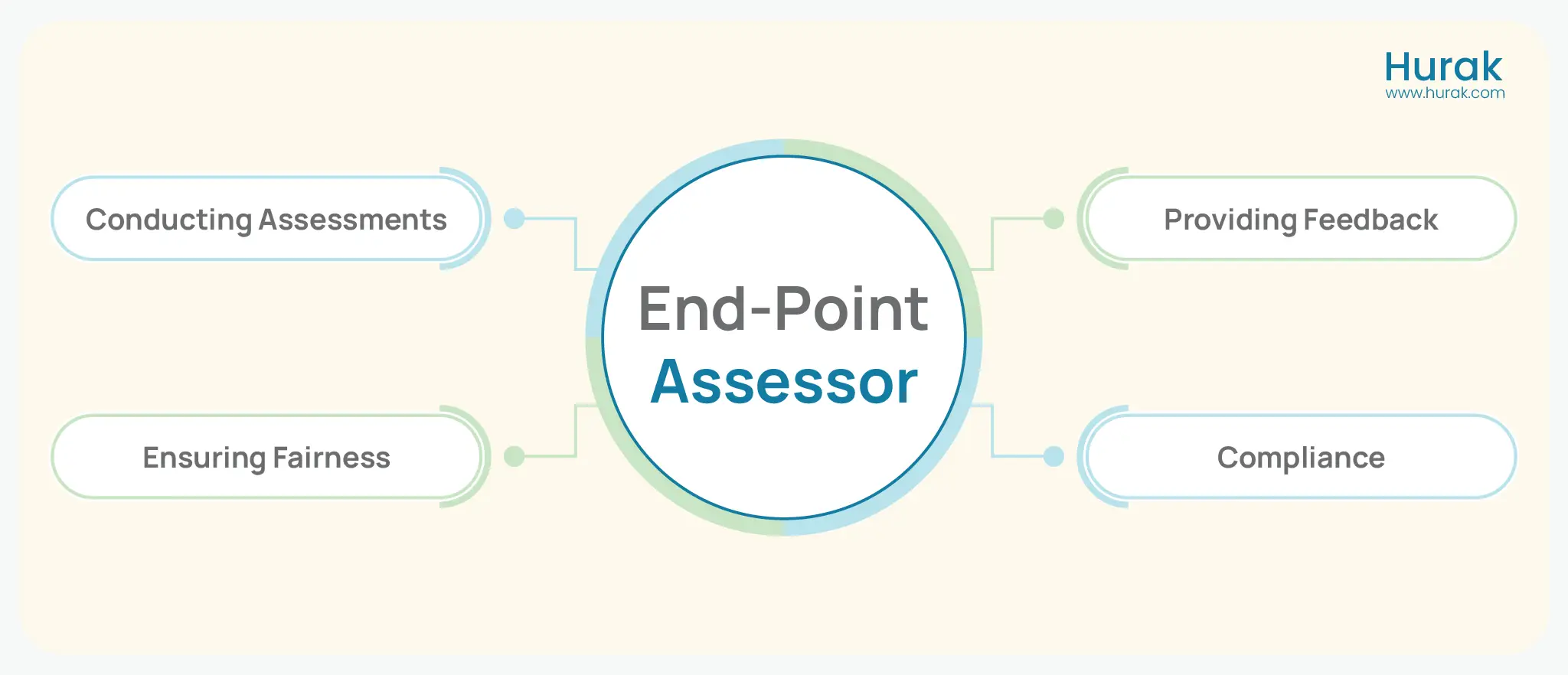The end-point assessor works with the apprentice only at the end of their apprenticeship to assess their skills. The assessor has no previous contact with the training provider, employer, or apprentice to ensure they remain fair and unbiased when judging the apprentice’s abilities.
What is an End-Point Assessor?
An End-Point Assessor is an independent professional who evaluates apprentices at the end of their training. They are not connected to the learning institution and do not participate in the apprentice’s training. Also known as Independent End-Point Assessors (IEPAs), they carry out final assessments using different methods.
End-Point Assessors are employed by End-Point Assessment Organisations (EPAOs), which operate independently from training institutions. Many EPAOs nationwide, including Awarding Bodies, Training Providers, and specialist EPAOs. To proceed, you must find a suitable EPAO approved to conduct assessments in your sector.
How to Become an End-Point Assessor
To become an End-Point Assessor (IEPA), you need to complete a recognised assessor qualification and meet certain requirements. While there isn’t one specific qualification for becoming an IEPA, here’s what you’ll need:
- Assessor Qualification: You’ll need an accredited qualification, such as the Level 3 Certificate in Assessing Vocational Achievement also known as the CAVA qualification. This qualification is the best option for becoming a fully qualified assessor and covers key skills needed for End-Point Assessments.
- Industry Experience: You must have hands-on experience in the industry you wish to assess, not just experience in evaluating.

Interested in Becoming an End Point Assessor in the UK Teaching Industry? Our assessor courses including the Level 3 CAVA Certificate offer a range of learning modules to help you become an endpoint apprenticeship assessor for any renowned organisation.
What is End-Point Assessment (EPA)?
End-Point Assessment (EPA) is the final stage of an apprenticeship. It evaluates whether an apprentice has gained the skills, knowledge, and behaviours required to perform their role effectively in the workplace. Unlike ongoing assessments during the apprenticeship, the EPA is conducted by an independent organisation to ensure fairness and objectivity.
The EPA involves several methods, which may include:
- Practical assessments
- Professional discussions
- Written tests
- Presentations or project work
Each apprenticeship standard includes an Assessment Plan that outlines the specific requirements and methods used by the EPA. Passing the EPA confirms the apprentice’s competence and leads to the completion of their apprenticeship.
What is the Difference between an NVQ Assessor and End Point Assessor?
An NVQ assessor evaluates learners working towards accredited qualifications. They work like on-programme assessors by guiding and supporting learners throughout their course. NVQ assessors usually work for colleges or independent training organizations.
Aspect | NVQ Assessor | End-Point Assessor (EPA) |
Role | Guides and supports learners throughout their qualification | Assesses the apprentice’s skills and knowledge at the end of the apprenticeship |
Assessment Timing | Ongoing assessments during the course or qualification | Final assessment conducted after the apprenticeship is completed |
Contact with Learner | Works closely with the learner, providing guidance and feedback. | Has no prior contact with the learner, employer, or training provider to ensure objectivity |
Employer/Provider Link | Works directly with the training provider or employer | Independent from the employer and training provider |
Work Environment | Typically works in colleges, training providers, or workplaces | Works for End-Point Assessment Organizations (EPAOs) |
Focus | Ensures the learner progresses through the qualification successfully | Evaluates whether the apprentice meets the required industry standards |
Qualification Types | Assesses a wide range of accredited qualifications, including NVQs | Assesses apprenticeship standards as outlined by Assessment Plans |
Assessment Methods | Includes portfolios, observations, and assignments | Includes professional discussions, practical tests, and written exams (as per the apprenticeship standard) |
This table highlights their different roles and responsibilities in assessing learners.
What is an End-Point Assessor Job?
An End-Point Assessor (EPA) is a professional responsible for conducting the final assessment of apprentices during their EPA. Their role is to ensure apprentices meet the required industry standards and are ready to perform their job roles effectively.
Responsibilities of an End-Point Assessor

- Conducting Assessments: Using observations, professional discussions, or reviewing projects to evaluate apprentices’ skills and knowledge.
- Providing Feedback: Offering fair and constructive feedback to apprentices based on the assessment.
- Ensuring Fairness: Maintaining objectivity and working independently from the training provider or employer.
- Compliance: Following the rules and guidelines set by the End-Point Assessment Organization (EPAO) and apprenticeship standards.
Where Do End-Point Assessors Work?
End-Point Assessors usually work for End-Point Assessment Organizations (EPAOs), which include awarding bodies, training providers, or specialised EPA agencies. They may work as employees or freelancers, depending on the demand in their sector.
End-point assessor jobs are critical in ensuring apprenticeships maintain high-quality standards, contributing to workforce readiness and development.



